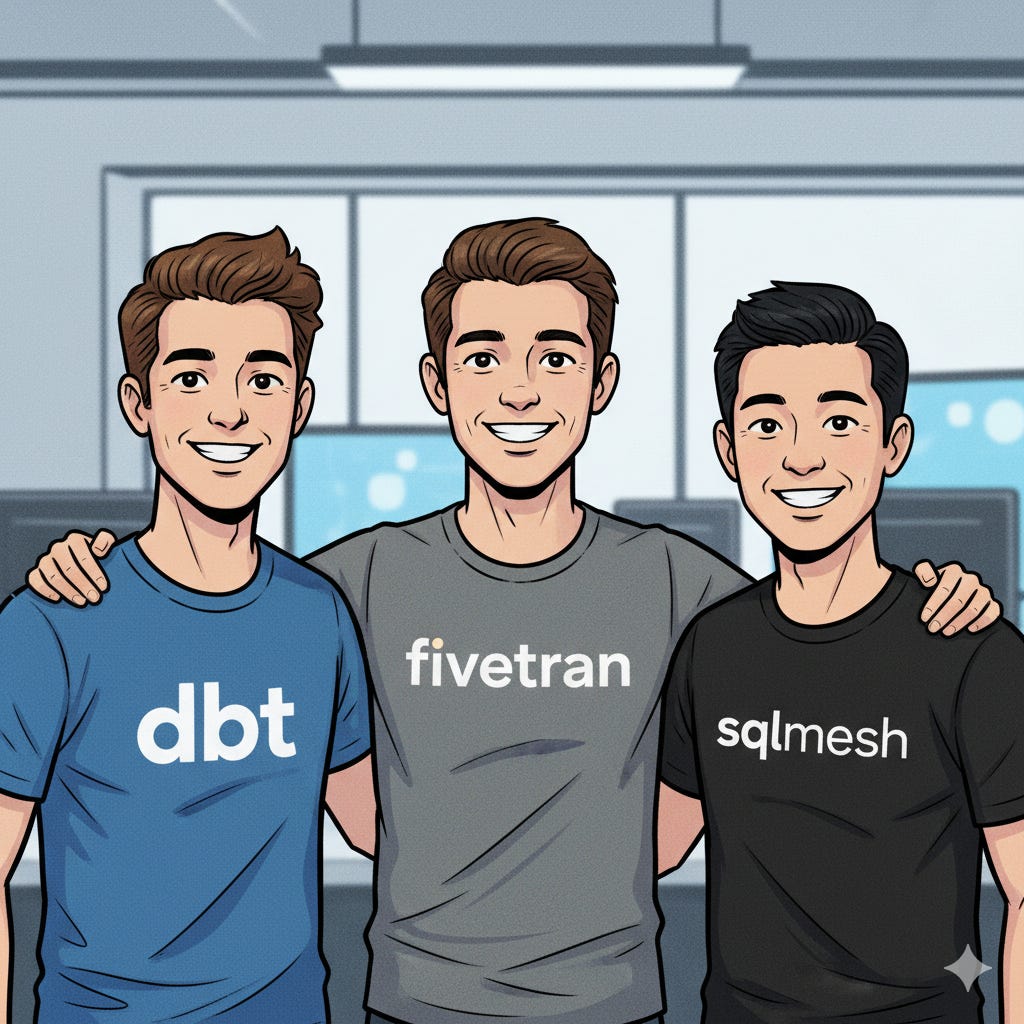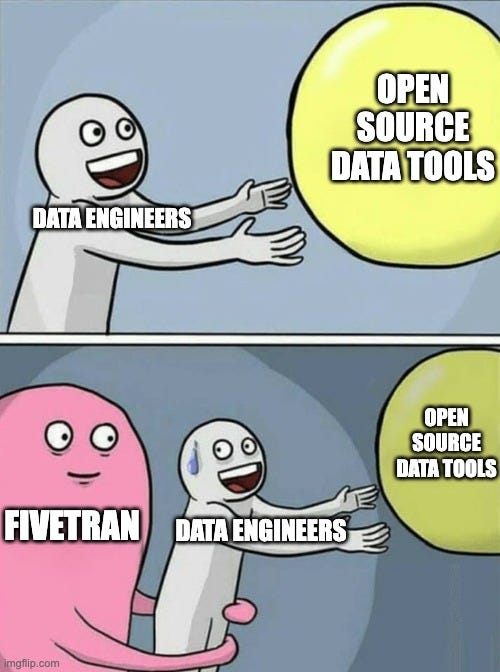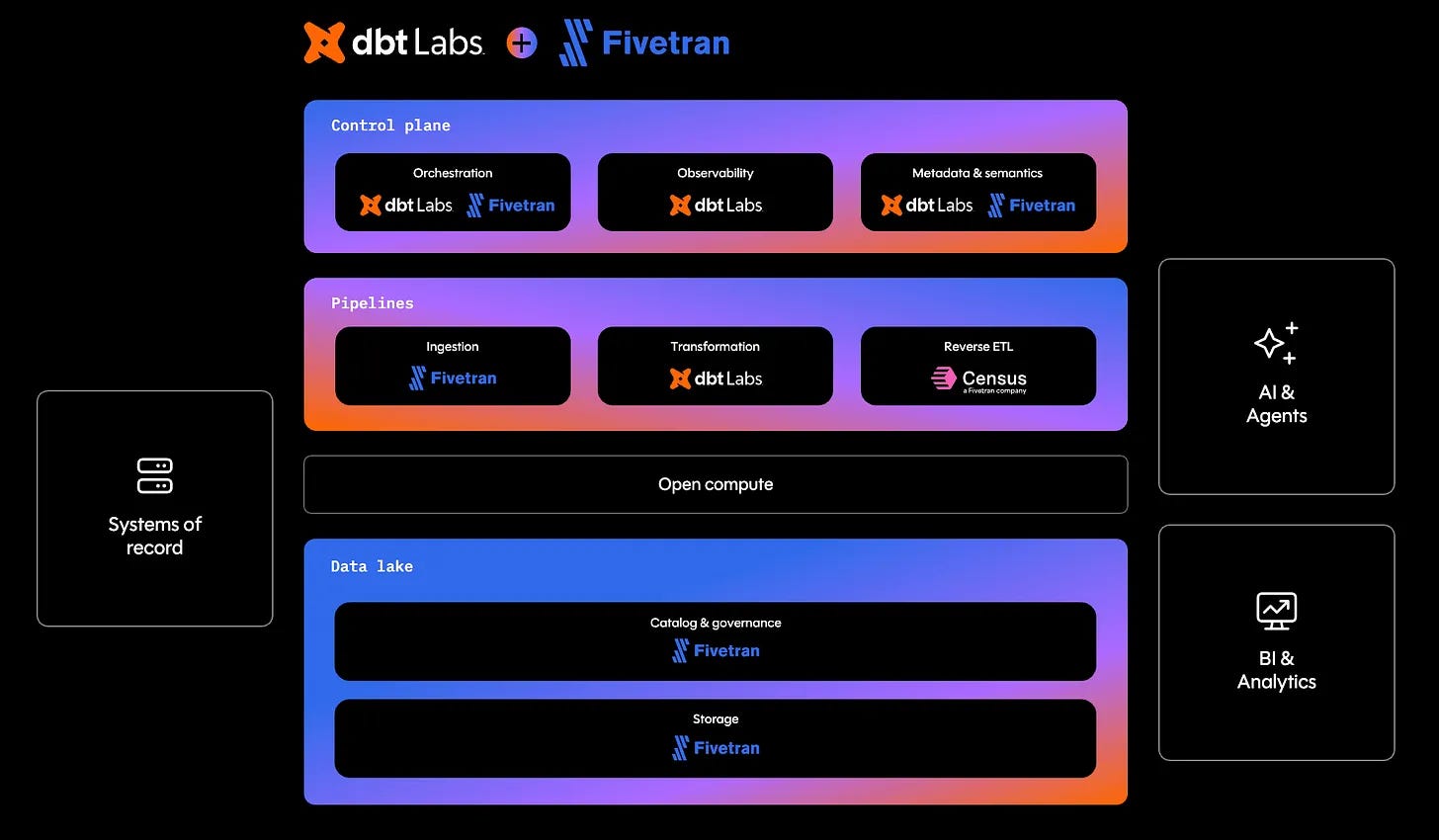Two weeks ago, the rumors started circulating that Fivetran and dbt were merging. Today, it’s official. This is a big deal, as both are major players in the data engineering world. Just a month and a half ago, Tobiko Data joined Fivetran which already previously acquiredCensus in May.
So… what on earth is happening in 2025?
In short, we’re seeing a major consolidation in the data ecosystem. The 2020–2021 boom brought an explosion of new data tools to the market, and it was hot 🔥. Just take a look at the MAD landscape to see how massive and fragmented the ecosystem has become 🤯.
Of course, many companies will continue to operate independently. But larger players, especially cloud providers, are either acquiring tools, offering open-source projects as managed services, or building competing features internally.
So, is this business as usual? In some ways, yes. But I care about this consolidation because I believe it will shape the future of our day-to-day work as data engineers (as I wrote a few weeks ago).
First Reaction: Joy
I tend to be optimistic about mergers, as they often create new opportunities and lead to better products for customers. A merger is also a strong signal that a product is valuable and here to stay.
That said, I’ve had a love–hate relationship with dbt and SQLMesh. I’ve spent countless hours working with dbt, often hitting frustrating rough edges. I helped smooth out some of them, but others persisted, and I didn’t see them disappearing anytime soon.
When SQLMesh entered the picture and addressed many of those pain points, I was genuinely excited. The team was available, and their vision felt like a potential “dbt 2.0”.
Now, the idea of bringing together the best of dbt and SQLMesh feels truly exciting 🙌
The official announcement also gives me hope that dbt Core will continue to be maintained and that the open-source DNA of dbt Labs will remain intact (just like with SQLMesh/SQLGlot).
I don’t yet know how these two tools will coexist, but I’m encouraged to see that SQLMesh’s dbt compatibility has now become a priority. One of my previously rejected requests was actually implemented a few weeks ago, which is a great sign.
Second Reaction: Fear
The modern data stack (MDS) emerged a few years ago when monolithic systems struggled to keep up with the rise of cloud data warehouses. Companies like dbt Labs saw the gap and filled it, shaping today’s industry-standard data platforms.
We moved from isolated, proprietary systems to open, interoperable tools and standards. While not everything was open source, the shift was significant. Hadoop had paved the way, but the MDS made modern data infrastructure accessible to everyone.
Still, consolidation brings risks. I worry that tools I love could become proprietary or abandoned.
Fivetran historically hasn’t developed “core” open-source tools (aside from contributing to many OSS dbt packages 🤯), so it’s unclear what will happen to dbt Labs and Tobiko Data’s products.
We’ve already seen license changes with dbt Fusion. dbt Fusion remains open, but not fully open. Maybe I’m overthinking it, but as I wrote in a dedicated article, if I can contribute but can’t freely use the software because of vague license terms “any substantial set of the features or functionality of the software” (which is kinda arbitrary), then it doesn’t feel like a great long-term investment of my time.
Another worrying sign:
Tobiko Data is missing from the chart, suggesting the brand wasn’t strong enough to make it into the spotlight (MetricFlow and SDF aren’t listed either).
Does that mean SQLMesh could be discontinued or merged into dbt Core or dbt Fusion? It’s too soon to tell, but I’m sure leadership already has a plan.
Third Reaction: Hope
Yes, the open-source surface area might shrink over time. dbt Fusion brings improvements like a faster Rust-based core and semantic features that may never land in dbt Core. But it also build new features such as query caching or better logs that could be exclusive as well. Some features, like UDF support, will be shared between both, but the gap will inevitably grow, and eventually, you’ll need to pay.
I don’t blame them; someone has to fund development at the end of the day.
However, I’d love to see dbt and Fivetran shift their business focus toward the ecosystem’s main revenue driver: the compute engine.
As I mentioned in my previous article on dbt Fusion:
There’s an intriguing possibility that dbt Labs could evolve into offering managed DataFusion layers, intercepting customer workloads and providing cost-effective alternatives for development and staging environments, and potentially beyond. This would represent a significant expansion beyond their current SaaS model, potentially capturing compute layer revenues in addition to their platform fees.
With the combined firepower of this merger, I hope the team builds a lightweight compute platform targeting small-to-medium workloads, a real competitor to Databricks, Snowflake, or BigQuery.
Apache DataFusion looks like a great foundation for such a backend, and I expect dbt Fusion to bring this missing piece eventually. For now, local previews are a step in that direction, but the big leap would be a fully featured compute platform.
In that world, dbt could serve as the entry point into the ecosystem, just like Iceberg serves as a gateway to Databricks. The depth of integration would become their moat, and dbt Fusion’s license could become more permissive again, maybe even back to Apache 2.0 like dbt Core.
Maintaining dbt Core, dbt Fusion, and SQLMesh separately doesn’t make much sense in the long run. If Fivetran doesn’t unify them, new players like Bruin or Starlake.ai might challenge them.
Also, limiting the VS Code extension to 15 free users per organization feels counterproductive. It should serve as a natural funnel into dbt Cloud through exclusive integrations. Just like cloud warehouses and BI platforms convinced enterprises that governance, performance, and convenience were worth multimillion-dollar contracts, I think Fivetran needs to take bold steps that benefit both the company and the ecosystem.
Maybe I’m being utopian, but it doesn’t cost much to dream 🙂
What’s Next?
If Fivetran’s goal is to build a unified data platform, they might not be done acquiring companies, though probably not again this year.
Here’s what could be next on their shopping list:
A BI/dashboarding tool (Lightdash?)
An advanced job scheduler (Dagster?)
A data catalog (Secoda?)
An AI agent platform (who knows?) — they’re hot right now, and I wouldn’t be surprised to see movement in that space.
Closing Thoughts
Whether we like the merger or not, dbt is alive and thriving. The teams at Tobiko Data and dbt Labs are talented, and I trust they’ll figure things out with their new coworkers at Fivetran. Let’s hope for the best outcome.
Maybe it’s time for a new name to capture George’s vision.
I’d personally vote for “Modern Data” or simply “Modern.” It would be a fitting nod to their role in shaping the modern data stack.
Congrats to all the teams involved, and good luck with the merger. I know what that journey feels like after more than six months navigating the Teads–Outbrain merger myself!
A Bit About Me
I’ve been using dbt in production for four years at Teads and exploring SQLMesh for over a year. I’ve contributed to both codebases, earning community awards from dbt Labs in 2024 and Tobiko Data in 2025).
I’ve also written several articles about them on Medium and Substack. I maintain the dbt-bigquery-monitoring package and have contributed to dbt-deltastream. I also tinker stuff on BQBooster.





Good post